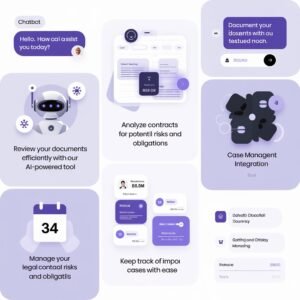The legal landscape is undergoing a significant transformation, driven by the integration of innovative technologies. One such advancement is the rise of virtual legal assistant (VLA) services. VLAs are essentially AI-powered assistants specifically designed to streamline legal processes and empower lawyers to focus on core strategic tasks. This article delves into the intricacies of VLA services, exploring their functionalities, benefits, and considerations for implementation.
Understanding Virtual Legal Assistants (VLAs)
At their core, VLAs are intelligent software applications trained on vast legal knowledge bases. They leverage natural language processing (NLP) capabilities and machine learning algorithms to comprehend legal terminology and interpret complex legal concepts. This allows them to interact with users in a natural, conversational manner, providing valuable support and automating various legal tasks.
There are two primary types of VLAs:
Chatbots:
Rule-based virtual assistants are like digital concierges trained for specific tasks. Imagine a meticulously organized library with clear instructions for finding information. These assistants function similarly, relying on pre-defined rules and programmed responses to navigate a vast knowledge base.
Their strength lies in handling common requests with efficiency. They can be your go-to resource for frequently asked questions, streamlining tasks like appointment scheduling, and even offering basic legal information, all within the parameters established by their programming. Think of them as a reliable source for getting things done quickly and consistently, particularly for well-defined queries.
AI-powered Assistants:
Rule-based virtual assistants are like digital concierges trained for specific tasks. Imagine a meticulously organized library with clear instructions for finding information. These assistants function similarly, relying on pre-defined rules and programmed responses to navigate a vast knowledge base. Their strength lies in handling common requests with efficiency.
They can be your go-to resource for frequently asked questions, streamlining tasks like appointment scheduling, and even offering basic legal information, all within the parameters established by their programming. Think of them as a reliable source for getting things done quickly and consistently, particularly for well-defined queries.
Unveiling the Power of VLAs: A Look at Key Functionalities

VLA services offer a plethora of functionalities that can significantly enhance legal practice efficiency. Here’s a closer look at some of the most impactful capabilities:
Task Automation:
Rule-based virtual assistants are like digital concierges trained for specific tasks. Imagine a meticulously organized library with clear instructions for finding information. These assistants function similarly, relying on pre-defined rules and programmed responses to navigate a vast knowledge base.
Their strength lies in handling common requests with efficiency. They can be your go-to resource for frequently asked questions, streamlining tasks like appointment scheduling, and even offering basic legal information, all within the parameters established by their programming. Think of them as a reliable source for getting things done quickly and consistently, particularly for well-defined queries.
Enhanced Client Communication:
Virtual Legal Assistants (VLAs) have the potential to significantly reshape the legal landscape by empowering clients with around-the-clock access to essential legal information. This innovation grants clients the flexibility to find answers to frequently asked questions at their own convenience, fostering a more informed and engaged client base. Furthermore, by alleviating the burden of addressing routine inquiries, VLAs allow legal professionals to dedicate their expertise to handling more complex matters.
This streamlining of tasks translates into enhanced efficiency and improved quality of legal services for clients. Overall, the implementation of VLAs presents a win-win situation for both legal professionals and clients, fostering improved communication, satisfaction, and ultimately, better legal outcomes.
Improved Legal Research:
AI-powered VLAs can scour vast legal databases and case law to identify relevant precedents and legal arguments, significantly accelerating the research process for lawyers.
Streamlined Document Management:
VLAs can assist with document organization, retrieval, and creation. They can also automate document review and identify missing information, ensuring legal documents are accurate and complete.
Cost-Effectiveness:
Compared to hiring full-time legal staff, VLAs offer a cost-effective solution for boosting legal practice productivity.
The Advantages of Utilizing VLA Services

Integrating VLA services into your legal practice offers a multitude of advantages:
Increased Efficiency:
In today’s fast-paced legal landscape, maximizing efficiency is crucial for success. Automating routine tasks and streamlining workflows empowers lawyers and legal teams to achieve more in less time. By leveraging technology to handle repetitive actions like document formatting, data entry, and e-discovery, legal professionals can free up valuable mental space and billable hours to focus on higher-level strategic thinking, client communication, and complex legal issues.
This not only enhances overall productivity but also reduces the risk of errors often associated with manual processes. Moreover, streamlined workflows ensure a smooth and consistent flow of information and tasks within the legal team, fostering better collaboration and quicker turnaround times, ultimately leading to improved client service and satisfaction.
Improved Client Service:
In today’s fast-paced world, clients expect prompt and efficient communication. This is where Virtual Local Area Networks (VLAs) come in. By creating dedicated communication channels within a larger network, VLAs ensure smoother data flow and minimize congestion. This translates to quicker response times for client inquiries, allowing businesses to address issues and concerns swiftly. With improved communication, clients feel valued and informed, fostering a sense of trust and satisfaction. This positive client experience ultimately leads to increased loyalty and retention, solidifying a business’s reputation for excellent customer service.
Cost Savings:
Virtual Legal Assistants (VLAs) can be a game-changer for legal firms seeking to optimize their workflow and staffing. By leveraging VLA technology, firms gain access to a pool of skilled legal professionals who can handle a variety of tasks, from document review and e-discovery to legal research and drafting.
This not only reduces the burden on existing legal staff, freeing them to focus on more complex matters, but also eliminates the significant costs associated with recruiting, hiring, and onboarding new full-time employees.
This newfound flexibility allows firms to strategically allocate resources based on project needs and workload fluctuations, ensuring optimal efficiency and cost-effectiveness.
In essence, VLAs empower legal teams to do more with less, paving the way for increased productivity and profitability.
Reduced Errors:
Automating tasks minimizes the risk of human error in repetitive processes, ensuring greater accuracy in legal work.
Enhanced Scalability:
VLA services offer a dynamic solution for businesses by seamlessly adjusting to meet changing workloads. This adaptability empowers firms to achieve optimal operational efficiency. Imagine a scenario where your business experiences a sudden influx of projects. VLA services can seamlessly scale up to handle the increased demand, ensuring all tasks are completed effectively. Conversely, during periods of lower activity, VLA services can adapt to a reduced workload, eliminating unnecessary costs and streamlining your operations. This flexibility provides businesses with the agility to navigate fluctuating demands while maintaining peak efficiency.
Considerations for Implementing VLA Services

While VLA services offer numerous benefits, there are certain factors to consider before implementation:
Security and Data Privacy:
When selecting a VLA service provider, prioritizing data security is paramount. This means ensuring the provider adheres to a robust set of protocols designed to protect the confidentiality, integrity, and availability of your sensitive client information. These protocols should encompass a multi-layered approach, including measures to secure data at rest and in transit, with encryption being a cornerstone.
Additionally, user access controls should be strictly enforced, with the principle of least privilege dictating access permissions. Regular security audits and penetration testing should be conducted to identify and address any vulnerabilities. By partnering with a VLA service provider that prioritizes data security through a comprehensive set of protocols, you can ensure your client information remains protected and foster trust within your client base.
Integration with Existing Systems:
Choose a VLA service that integrates seamlessly with your existing legal practice management software and workflow.
Training and Support:
Equipping both lawyers and staff with the necessary knowledge and skills to effectively leverage the VLA service is crucial. This can be achieved through a comprehensive training program that covers in-depth instruction on VLA’s functionalities, including navigation, utilizing search tools to pinpoint relevant legal information, and properly incorporating VLA’s findings into legal strategies. Furthermore, the training should address administrative tasks associated with VLA, such as user account management and data security protocols.
By ensuring both lawyers and staff possess a strong understanding of VLA, legal teams can maximize the service’s potential to streamline workflows, enhance research efficiency, and ultimately deliver superior legal services to their clients.
Scope of Practice:
It’s crucial to understand the limitations of VLAs. They are not replacements for lawyers but rather powerful tools to augment legal expertise.
The Future of Legal Practice: A Collaborative Approach with VLAs
The legal industry is on the cusp of a paradigm shift, with VLA services playing a pivotal role. By embracing this technology, lawyers can optimize workflows, enhance client service, and operate more efficiently. As VLA capabilities continue to evolve, we can expect a future where humans and AI collaborate seamlessly, leading to a more agile and cost-effective legal ecosystem.
Check also:Google Finance Watchlist is Legit
Conclusion:
virtual legal assistant (VLA) services represent a transformative force within the legal landscape. By leveraging automation, intelligent research assistance, and streamlined communication, VLAs empower lawyers to focus on what they do best – strategic legal thinking and client advocacy.
The integration of VLA services fosters a future where legal practices operate with greater efficiency, deliver exceptional client service, and navigate the complexities of the law with newfound agility. As VLA technology continues to develop, its impact on the legal industry is poised to be even more profound. By embracing this collaborative approach, legal professionals can unlock a brighter horizon for the future of legal practice.

